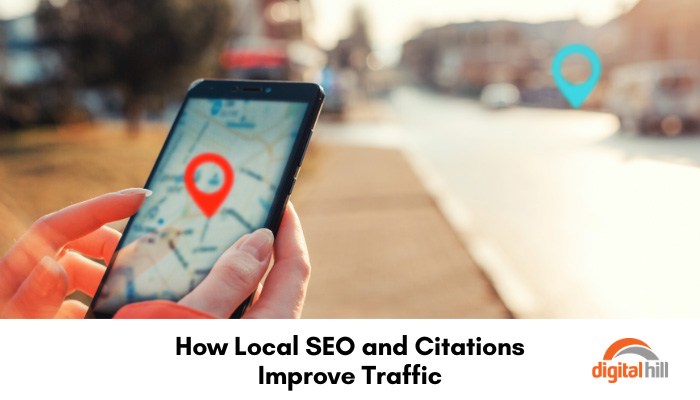How Local SEO and Citations Improve Traffic

In today’s digital world, if you’re a small or medium-sized business owner, understanding the ins and outs of local SEO and citations is crucial for driving traffic to your business. It’s not just about being online these days, but also about being easy to find online. Here’s a beginner’s guide to help you navigate local SEO with ease.
1. What is Local SEO?
Imagine you’re walking down a busy street looking for a coffee shop. You pull out your phone and type “coffee shops near me” into a search engine. The shops that pop up at the top of your search results? They’ve mastered local SEO.
Local SEO is the process of optimizing your online presence to attract localized search traffic on Google and other search engines. Local SEO done well is the digital equivalent of putting a big, flashy sign in your storefront window.
Why It Matters
For local businesses, local SEO is a game changer. It puts your business in front of potential customers who are actively searching for products or services you offer in your geographical area. It’s targeted, efficient, and incredibly effective.
2. The Role of Citations in Local SEO
A citation is any online mention of your business’s name, address, and phone number (NAP). Citations are found on websites other than your own. Think of them as the digital footprints that lead customers to your shop.
Where to Get Listed
Digital citations are in various places, including:
- Business directories (like Yelp, Google My Business, Better Business Bureau, and the Yellow Pages)
- Social platforms (like Facebook, Instagram and LinkedIn)
- Review websites
- YouTube
- Other websites and apps
Getting your business information accurate on these platforms can significantly impact your local SEO.
Consistency is Key
The golden rule of citations is consistency. Your NAP details must be identical wherever they appear. Even minor discrepancies, like street abbreviations, can confuse search engines and dilute your local SEO efforts.
3. Optimize Your Google My Business Profile
A well-optimized Google My Business (GMB) profile is crucial. After all, it’s often the first thing people see in local search results. Here’s how to make yours stand out:
- Claim and Verify Your Listing: If you haven’t already, claim your GMB listing. It’s free and gives you control over your business info on Google.
- Complete Every Section: Provide as much information as possible – business hours, description, services offered, etc.
- Add Photos: Businesses with photos see more engagement. Show off your products, your team, and your premises.
- Encourage Reviews: Getting some good reviews can increase your visibility and increase the chances that prospects will visit your location.
4. Leveraging Local Keywords
Keywords are the terms and phrases that potential customers use to find services like yours. For local businesses, especially those with physical storefronts, it’s important to focus on local keywords.
Here’s an example: Instead of just using “coffee shop”, use “coffee shop in [Your City]” or “best coffee in [Your Neighborhood]”.
How to Use Them: Sprinkle these local keywords throughout your website – in your content, meta descriptions, and even in image alt texts.
5. Building Local Backlinks
Backlinks – links from other websites to yours – are a vital part of SEO. For Local SEO, focus on getting backlinks from local businesses and organizations. This can include:
- Local news websites
- Chamber of Commerce pages
- Local bloggers
These links tell search engines that your business is a relevant and integral part of the local community.
Mastering local SEO and citations isn’t just about being visible online; it’s about strategically positioning your business to be found by the right people at the right time. By optimizing your GMB profile, ensuring consistency in your citations, leveraging local keywords, and building local backlinks, you’re setting the stage for increased foot traffic and, ultimately, more business.
Remember, local SEO is an ongoing process. Keep your information up-to-date, continually optimize your website, and consistently engage with your local community online to maintain and improve your local search presence.
